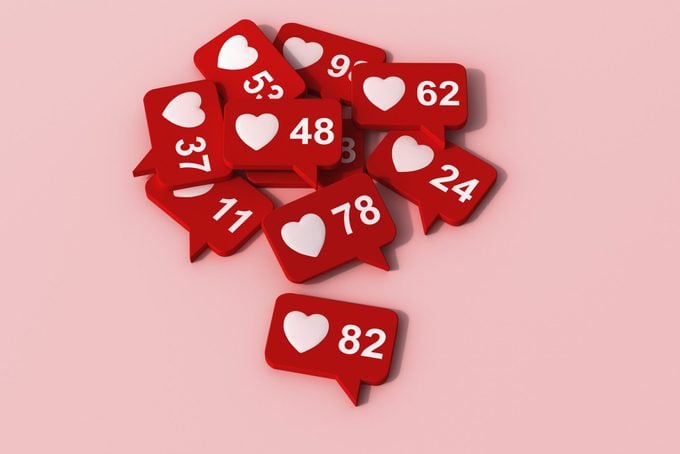11 Netiquette Guidelines to Follow for Respectful Online Interactions

Don't get caught using poor netiquette. Experts share the best practices for online behavior.
It all happened so fast: In a just under two decades, we’ve learned to communicate online—through texting etiquette, email etiquette and social platforms. From sharing family photos with faraway relatives to making professional connections and commenting on political or social issues you’re passionate about, the online world is an open forum for sharing. And if you’ve ever seen online acquaintances duke it out in the comment section or cringed at old Instagram photos that haunt you before a job interview, you know that with advantages come etiquette pitfalls. Enter netiquette: your guide to an online life that you can feel good about, no emotional hangover necessary.
Get Reader’s Digest’s Read Up newsletter for etiquette, humor, cleaning, tech, travel and fun facts all week long.
What is netiquette?
Just like it sounds, netiquette is etiquette on the net. Even though online platforms can seem like the Wild West at times, there’s no need to add to the chaos—the digital world still requires rules of conduct. We’ve asked two experts to give us their most important rules of the web.
Parent, don’t sharent
“I think the most important rule for me is that as a parent, do not share your children’s pictures or private information online,” says Jennifer Zhu Scott, a technology executive and mom of two. Because of user agreements, even when you post to a private account on platforms such as Facebook or Instagram, that content is no longer yours, she says. Additionally, others can screenshot or download your pictures and posts without you knowing.
When your kids become adults, they can decide what content to share about themselves, but it’s not fair to make those decisions for them while they’re still children. Even on her private Instagram account, which is only visible to close friends and family, Zhu Scott never posts pictures of her children. “I can’t emphasize this enough: Honor your children’s will when they can actually make their decision (about) what kind of digital presence they want as adults,” she says. “Don’t take that away by posting pictures out there without their consent.”
Use respectful language
It’s important to remember that everything you do online leaves a digital footprint. If you wouldn’t say something or use certain language in person, then refrain from doing it online. Using common etiquette, including no name-calling, cursing or writing anything deliberately offensive, is all wise, whether you’re writing an email, social media post or conversing in chat rooms.
Keep an eye on privacy
“Privacy is freedom,” says Zhu Scott. “It’s always easier to share than to take information back, so think twice before you share.” Beyond improving your online security and avoiding sharing your data to online scammers, you must also keep in mind new technologies, such as artificial intelligence, which can use photos and audio that we give away for free on our social media accounts.
In the near future, “I think it will be a complete privilege” for a person to not have images of their lives online, she says. Via user agreements and data brokers, “some third parties can use your voice, your face and your image to create something completely against your will.” So now might be the time to take a hard look at what you’re putting out there.
Fact check before reposting
We’ve all been there: We see a piece of incendiary content and our first urge is to take action and share. “It’s super easy to get your blood boiling, but often what we see could be taken out of context,” says Zhu Scott. Headlines and social posts may be written in an attempt to anger users and keep their attention—not for some lofty purpose, but to make more money, she continues. “When people get angry, they tend to interact with each other more. And the more attention [someone] can create, the more revenue dollars a [piece of] social media content can generate.”
Proper netiquette says to pause and fact check. With growing concerns about misinformation and disinformation, it’s best to look at everything with a critical eye, says James Halbert, who studies online interactions and is an associate professor in industrial organization and psychology at Adler University. “When you’re finding information online, always go to the source.” For Halbert and his students, that means tracing claims back to peer-reviewed articles, rather than relying on Wikipedia. “It’s good to keep a watchful eye on that material. It may not be true.”
Additionally, Zhu Scott says to remember that the online world is international. A piece of content may have a cultural context you’re not familiar with—so think before you jump to conclusions. “People have a tendency to use their own lens to judge other people without appreciating the cultural context,” she says. “Don’t judge too quickly.”
Debate like a gentleperson
If it’s a controversial topic you’d avoid at Thanksgiving dinner, consider avoiding debating about it online. But if it’s something you feel strongly about, there are certainly ways to debate respectfully. While online debates can be notoriously tricky—hence the term “flame wars”—Zhu Scott says you don’t necessarily have to shy away from participating. “I think having a debate on issues is a wonderful thing,” she says, as long as you’re open to learning.
Instead of trying to overwhelm others with superior opinions, think of it as an exercise in mutual listening, where the desired result is that everybody learns more about the truth. Good online debate netiquette means “holding the spirit to seek for truth, even if the truth is very different from what I originally thought,” Zhu Scott says.
If you want to speak up in a cordial way about a troubling post, a good place to start is asking where the information came from, Halbert says. “It’s a way of challenging something without saying, ‘Hey this is wrong,'” Halbert says. “You have to take your emotion out of it,” and focusing on whether the content is factual helps to do so.
Take it offline
If someone is offended by something you’ve posted or by a comment you’ve made, and you can sense things may become heated, Halbert has a simple netiquette rule: Take it offline. “I would call my friend up and say, Hey, dude, what’s going on?” he says. When responding to a negative comment, rather than having a drawn-out fight on social media for the whole world to see, Halbert recommends trying to “resolve the issue as solidly as possible.” And to do that, he says, it’s better to pick up the phone.
“The problem is we don’t call people anymore,” he says. Posts and emails can be misconstrued because it’s hard to convey and detect tone. Perhaps your friend—or you—didn’t understand how the post or comment was intended. A phone call can clear that up quickly, Halbert says.
Don’t confuse adding friends for being a good friend
We may feel connected to distant family members or to old friends because we see their new posts, but “it’s a false sense of connection,” says Halbert. “We don’t know what they’re struggling with. You know that when you talk to them on the phone every day, when you have a personal relationship with them,” he says.
Research has shown that, especially for Generation Z, while socializing online can create a sense of connection, it can also elicit a sense of isolation, says Halbert. That’s because we tend to compare the overwhelmingly positive posts we see with our own more nuanced lives—and feel that we fall short. It’s important to remember that online connections cannot replace community and building in-person relationships, Halbert says. If the internet is your primary way of connecting with people, that’s very dangerous.
Be professional, even on your personal account
Not following netiquette rules can be just as damaging as résumé mistakes. If your personal account is public, or if you only have one account for both professional and personal interactions, recognize how these two worlds are connected. When you express yourself on social media, you should be aware of business etiquette because “you’re not always representing yourself, you’re representing a lot of other people, especially as a professional,” Halbert says. Before posting something, he always considers the context and readers.
Another solution is to maintain a public professional account and a personal one only visible to a small group of trusted friends and family, says Zhu Scott, who has opted for this approach. “Sharing too much personal, sensitive information can be inappropriate and risky,” she says. Even if you’re a social media influencer, she says, “be smart about it, be strategic.”
Choose connections wisely
This netiquette rule can protect your privacy and professional image. Be careful about who you connect with, both experts say. Zhu Scott says she has learned how to say no: She’s constantly turning down friend requests with a polite message explaining why.
As for Halbert, “I’m very careful with whom I connect,” he says. Rather than adding anyone who asks, he maintains a LinkedIn network of connections with students, colleagues and professionals in his field whose work he admires. Rather than following particular content creators, he follows professional organizations.
Interact sparingly
You may feel pressured to like everything that friends or professional connections post, just to be polite. But Halbert advises the opposite. First, liking or commenting on a post will encourage a platform’s algorithm to show you more posts by that person or similar content, which works against you if you’re using your account to stay abreast of what colleagues or friends are doing. But more important, most platforms will tell your entire network that you’ve liked a post and, for better or worse, that can become the basis for judgment, especially if it’s controversial or even an Instagram scam or Facebook scam. Halbert reserves likes for professional work he truly admires.
Keep it simple—and stress-free
One netiquette rule that can help set boundaries for your own well-being is to consider reducing the number of social media accounts you use. “You don’t realize that’s an extra stressor you’re putting in your life,” Halbert says. “When you’ve got multiple accounts, you have to check this one, you’ve got to check that one, you’re afraid of leaving someone out, people are waiting on your response, what do they think about your response?” All of this adds extra stress.
Despite the fact that his research focuses on the online world, Halbert himself has only one social media account: his LinkedIn. He knows he would have more connections if he put his personal life across various social media platforms, but for him, that’s a small price to pay for less stress.
About the experts
- Jennifer Zhu Scott is the CEO of IN. Capital, an investment company that focuses on artificial intelligence and deep tech. Her TED talk on how she handled her children’s smartphone use has more than 3.3 million views.
- James Halbert is an associate professor at Adler University, where he directs the graduate program in industrial organization and psychology. In February 2023, he and colleagues published the book Community Engagement in the Online Space. He also investigates social media and its effects on stress.








